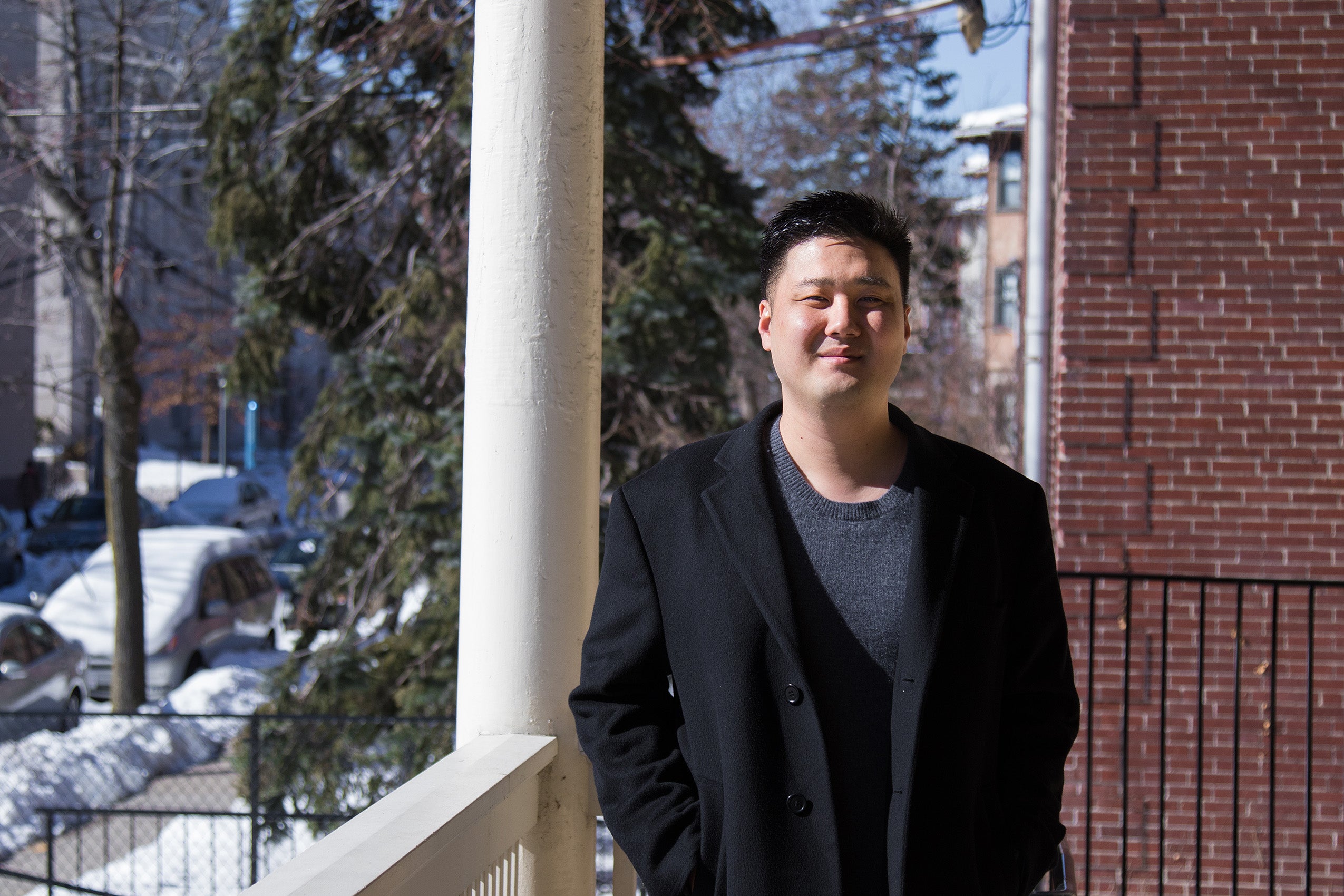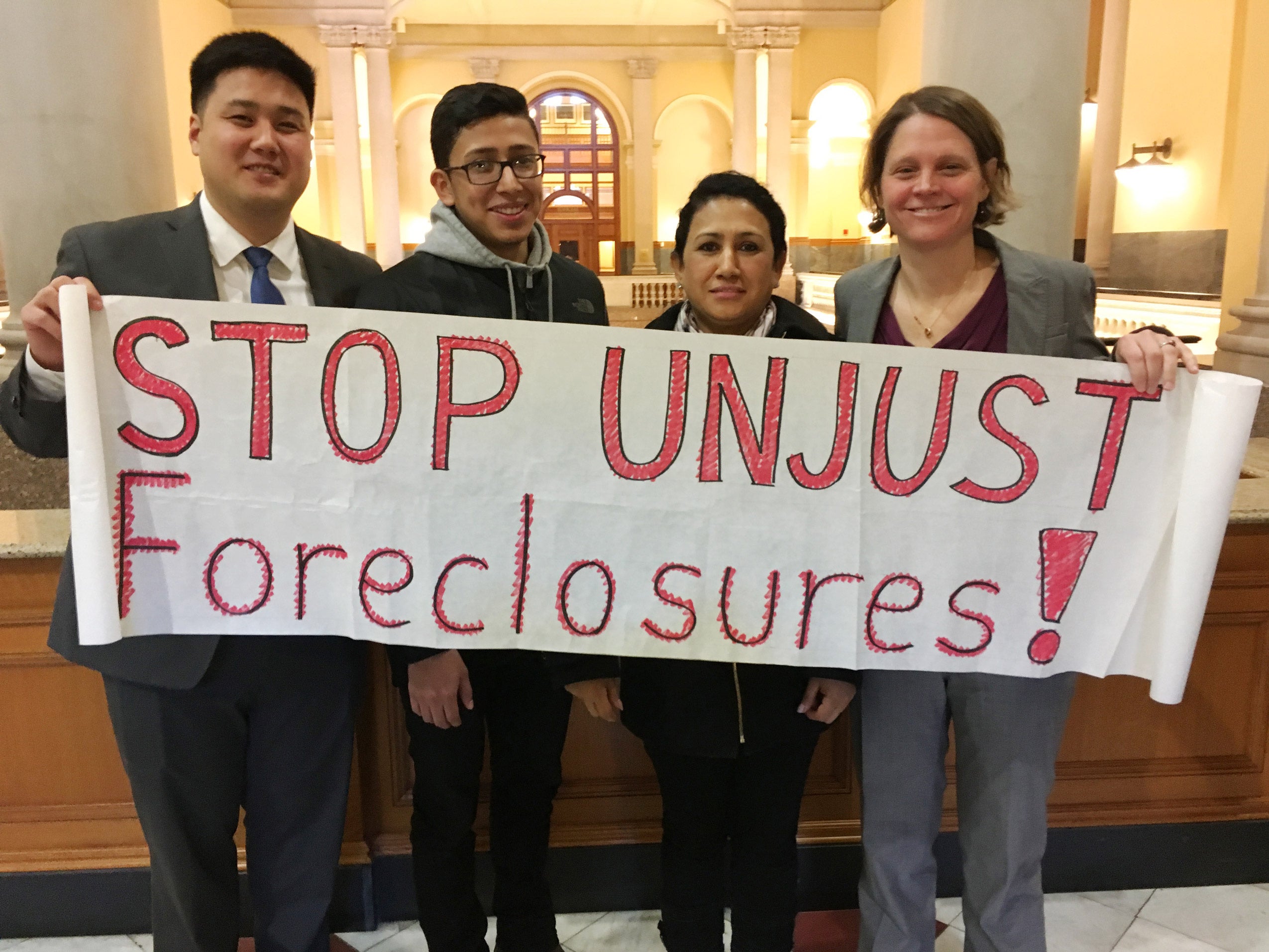On the morning of January 9, 2017, Harvard Law School student Dayne Lee ’17 slipped into a suit after three sleepless nights, punctured with dreams about his major oral argument. Later that day, he would argue before the Massachusetts Supreme Judicial Court (SJC) in a case pitting federally controlled mortgage giant Fannie Mae against Lynn, Massachusetts homeowner Elvitria Marroquin, who has been fighting foreclosure on her home since 2008.
The question before the court was whether Fannie Mae and large financial institutions should be immunized from their failure to send a proper notice of default because the foreclosure took place within a grace period purportedly set in a prior SJC decision.
The decision, expected in a few months’ time, will set a precedent potentially impacting scores of foreclosed homeowners.

“Fannie Mae was created by the federal government during the New Deal to help homeowners, not to hurt them,” Lee said. “The banks should be held accountable for their own mistakes and held to the law. Millions of working class, middle class, immigrant, and families of color continue struggling with the ongoing impact of the foreclosure crisis.”
Lee represented Marroquin under Massachusetts Supreme Judicial Court Rule 3:03, which allows student attorneys to serve as counsel to indigent clients across the state. He worked alongside a team of students and licensed attorneys from the Harvard Legal Aid Bureau, the largest and oldest student-run legal aid organization in the country, and second-largest provider of legal aid in the Greater Boston area.
Marroquin, who immigrated to the U.S. from Guatemala, bought her first home in Lynn in the early 2000s with a toxic mortgage during the housing bubble. She fell behind on mortgage payments and Fannie Mae foreclosed on her home instead of working out a sustainable loan modification.
Thanks to outreach from community organizers in Lynn, Marroquin was aware of the possibility of continuing the fight for her home after the foreclosure. “Proactive outreach is critical,” notes Isaac Simon Hodes, director of the Lynn United for Change Empowerment Project, a local housing justice group. “Without a grassroots organization to support them, most families in foreclosed homes pack up and leave and never realize they could have fought back.”
Marroquin stayed in the home with her two sons and kept working, trying to save up enough to buy their house back. Fannie Mae eventually sought to evict the family, but HLAB fought the eviction and underlying foreclosure in court on a Limited Assistance Representation basis.
“A foreclosure is a very serious thing because a family is losing its home,” Lee said. “The banks and lenders caused the financial crisis, and then they cut corners and foreclosed on thousands of homes in Massachusetts and millions of homes across the country. They started breaking the law and taking shortcuts, hurting people like Ms. Marroquin, and that’s never okay.”
Taking Up the Case
Marroquin’s four-year litigation began in 2012, but the groundwork for HLAB’s involvement was laid years before. The late David Grossman, the HLAB faculty director from 2006-2015, and Eloise Lawrence, clinical instructor in Community Lawyering (then-HLAB staff attorney under a generous grant from the OAK Foundation) had teamed up with City Life / Vida Urbana — a community organization promoting tenant rights and preventing housing displacement — to develop a unique strategy of challenging foreclosures on a large scale through defense against post-foreclosure evictions.
“The key to keeping Ms. Marroquin in her home for all these years and to ensuring she had the faith and energy to continue to fight against very powerful forces has been Lynn United,” Lawrence said. “Without their extraordinary organizer, Isaac Hodes, and all the residents of Lynn who have repeatedly stood in court with Ms. Marroquin or marched to City Hall in solidarity, we at HLAB would never have had the privilege to represent her in court because she would have left her home like the millions of other homeowners, without a fight, because they didn’t know their rights or have the means to make these rights a reality.”
The collective strategy was to use eviction proceedings to fight specific individual foreclosures and inform people of their rights. HLAB went to court and offered to help every single person being evicted from his or her home due to foreclosure, not just those who had reached out for legal help.
In 2015, HLAB took on Marroquin as a client for full representation, after previously representing her on a limited basis in the original post-foreclosure eviction case. In April 2016, Lee joined to help write the direct appellate review petition to advocate for Marroquin’s right to stay in her home.
Penning the Appeal
In April 2016, Lee and a team of three other HLAB students put their Lexis and Westlaw accounts to use, conducting hours of legal research and writing the appellate review petition in Marroquin’s case. Once the SJC accepted the case, Lee, Anna Kurtz ’17 and Catherine Ordoñez ’18 drafted the brief to the SJC.
“The principle we wanted to promote is that when big banks and lenders cause a foreclosure crisis and they’re the ones not only foreclosing, but also sitting on the home and later selling it off, they shouldn’t receive any extra protections from the law,” Lee said. “They should be required to follow the law and the law should protect former homeowners.”
This was an opportunity to argue not just about the law, but about whom the law should protect.
“Fannie Mae chose to not inform Ms. Marroquin of her rights, as required by law. The notice requirements that Fannie Mae ignored are a consumer protection,” Ordoñez explained. “Being a part of the team that wrote this brief showed that we, as law students, can play a part in protecting consumers and chipping away at the power imbalance between lenders and borrowers.”
Preparing for Oral Argument at the SJC
How did Lee prepare for one of the biggest oral arguments of his life? He offered two words: “Team effort.”
In the eight weeks leading up to the argument, scores of people helped Lee prepare for four mock hearings in front of mock judges. HLAB students and clinical instructors attended, hurling hardball questions, as did foreclosure and legal aid housing lawyers across Massachusetts, from Boston, Lynn, Springfield, and Worcester. With a smaller core group of Lawrence, Kurtz, and Ordoñez, Lee practiced repeatedly. His colleagues “drilled [him] on how to address different questions, how to present [himself], and how to speak slowly and competently” to get the argument “as tight, clear, and precise as possible,” he said.
The HLAB team focused on how to most effectively communicate three main points to the Justices. The moots proved critical in shaping the argument Lee would make in Massachusetts’ highest court.
“Moots bring a fresh pair of ears to what you’re trying to say. We ended up completely changing our emphasis because of the moots,” Lee said. “Experienced lawyers, judges and professors told us, ‘You should focus on the fact that here there’s a bank that shouldn’t be protected by the law for its own mistakes.’ The moots completely changed our strategy and we’ll find out in a few months if it worked.”
On the day of the argument, Lee had the jitters. But after he watched another argument before his own, he thought to himself, “Hey, I can do this too.” Looking to a crowd of Lynn community members and colleagues behind him, he shook off the nerves.
“We practiced so much, this was just another drill,” Lee said.
Partnering with the Community
“Elvitria’s story shows what can happen when there’s really close collaboration between a legal aid group and local grassroots organizations,” said Hodes. “On the legal side, she beat the eviction case, she has a chance to get her house back, and there’s the potential to set an important legal precedent. On the organizing side, this process has given her the chance to speak out publicly and to get involved with the broader housing justice movement. Without the voices and activism of people like her, the Lynn City Council never would have passed the strongest anti-foreclosure ordinance in the state.”
Marroquin says that Lynn United empowered and supported her to stay in her home.
Her advice to others experiencing foreclosure? “Don’t be afraid and stay in your house fighting for your rights.”
Community Organizing and Lawyering, Together
Before coming to law school, Lee was a community organizer in Koreatown, Los Angeles working with low-income immigrants and informing them of their rights. He came to law school to gain legal tools to advance social justice for communities of color.
The way he puts it, organizing and community lawyering can go hand-in-hand, but it’s not intuitive.
“To me, organizing is almost the opposite of lawyering. It’s about telling people that they have leadership and power, and equipping them with tools to discover their leadership and come together with their own communities to make change,” Lee said. “How lawyers fit into that is lawyers have to be humble and use our power and understanding of the law to help people make change, and to make sure the law doesn’t get in their way.”
The decision in Federal National Mortgage Association vs. Elvitria M. Marroquin & Others is expected in spring or early summer.
You can watch HLAB student Dayne Lee’s oral argument on the Suffolk University School of Law website.
Nadia Farjood ’18 is the Communications Director of the Harvard Legal Aid Bureau.
